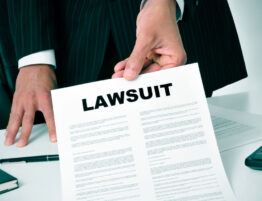
Despite your best efforts, it’s possible that you, as an executive of a company, will be sued. It’s in your best interests to consult a defense attorney for lawsuits against a company to discuss the allegations and work out a solid defense.
In some cases, the allegations of wrongdoing come directly from the shareholders whose interests you’re supposed to be protecting. It’s important to know your obligations and the manner in which they can be violated, so you can protect yourself from legal action.
What are the Fiduciary Duties of Executives of a Company?
Executives have fiduciary duties to a business’s shareholders. Legally, they are the foundation on which their relationship with the CEOs is based.
The American Bar Association ruled that an executive’s relationship with the shareholders has more legal weight than its relationship with creditors. This is largely because executives are entrusted with controlling shareholders’ property.
Key elements of the relationship include trust, loyalty, acting in good faith, and keeping the company’s interest first and foremost in mind.
Duty of Loyalty
The executive’s loyalty to the company is unimpeachable and precludes conflicts of interest. Executives must notify the board should a conflict of interest exist.
The board decides what to do with the information. In many cases, the executive is just excluded from decisions that would benefit their interests.
Duty of Diligence
Due diligence involves careful investigation and risk analysis of potential actions and presenting the findings to the board.
The board uses the information to make decisions about things like signing a contract with another company or extending the company into another city.
Duty of Obedience
Executives uphold the company’s principles and business practices and work towards the company’s goals by including employees in the scope of operations.
They ensure that the employees also uphold the company’s policies and don’t violate any governing rules and legislations.
Examples of Violation of Fiduciary Duties Made by Company Executives.
Violating fiduciary duties is a legally actionable offense. The board of directors can sue the executive for damages.
The executive may still be able to use the company’s business litigation defense attorney to plan their case.
Before filing a civil lawsuit, plaintiffs must be able to prove the violation or breach. Proof includes:
- Evidence that there was a relationship between the fiduciary and the plaintiff.
- Evidence the fiduciary violated or breached their legal duty.
- Evidence of damages.
- Evidence that the damages were caused by the breach of duty.
The types of violations include:
A Breach Between Employers and Employees
The employee has a fiduciary duty to their employer. There’s a breach when the employee acts against the employer’s best interests.
For example:
- Fraud, embezzlement, or improper use of funds.
- Corporate espionage
- Consistently refusing to follow directions and acting in a careless and negligent manner.
A Breach Between Business Partners
In a business partnership, each party has a fiduciary duty towards the other. A breach occurs when one party betrays the trust of the other by behaving in a reckless and irresponsible manner. The business suffers as a direct result of this behavior.
For example:
- Reckless spending, fraud, bribery, theft, and/or embezzlement.
- Behavior that ruins the business’s reputation and standing in the community.
- Criminal behavior.
- Concealing important information to delay action so they can benefit in some way.
A Breach Between Directors and Shareholders
Directors are elected by shareholders with the understanding that the directors will use their discretion to make decisions that will benefit the company. The breach occurs when directors act and make decisions that will benefit their needs and not the shareholders.
For example:
- Delaying dividend payments.
- Refusing access to records.
- Behaving in an abusive manner towards minority shareholders.
- Voting for excessive salaries for themselves.
What Should an Executive Do When Accused of a Lawsuit?
The first thing you should do is remain calm; not shout and harangue the person who has accused you of wrongdoing.
The next step is to notify the company’s business litigation defense lawyer. Arrange for a consultation so you can lay out the facts of the matter as you see them.
There will be a formal internal investigation. You must cooperate, be honest, and provide copies of supporting evidence documenting your side of the case.
If your attorney advises it, you can try to talk to your accuser to clear up misunderstandings. Have witnesses present. For example, arrange to meet in the meeting room with the attorney and head of HR present. Without witnesses, the accuser could walk away from the meeting and make further accusations of inappropriate behavior behind doors.
Hear their side of the story without interruption, even if they say things that are blatantly untrue or exaggerated. Then present your side of the story—if it is just a misunderstanding, it can be resolved there and then.
If not, end the meeting politely and return to your business litigation defense attorney to plan the next steps in your case.
Reasons to Consult with a Corporate Defense Attorney Near Me
Accusations that lead to a lawsuit are serious. Different elements of law come into play. Anyone trying to defend themselves can easily get tied up in knots while trying to unravel the mysteries of employment law.
There are no mysteries for a business litigation defense attorney. They know the correct legal processes that go into defense and what evidence is needed to support your case.
A defense attorney takes a lot of stress off your shoulders because you know you have an expert in your corner. All you have to do is follow their advice and let the process proceed.
Let LibertyBell Law Group Prepare Your Defense in a Court
There are several types of business lawyers, including project finance lawyers, venture capital lawyers, and lawyers who specialize in mergers and purchasing. LibertyBell Law Group has business attorneys for every situation.
What’s more, we provide 24-hour service and your first consultation with us is free. We’re the first choice when you’re looking for a defense attorney for lawsuits against a company. To find out how we can help you, contact us at 866-320-4854 at LibertyBell Law Group today!









